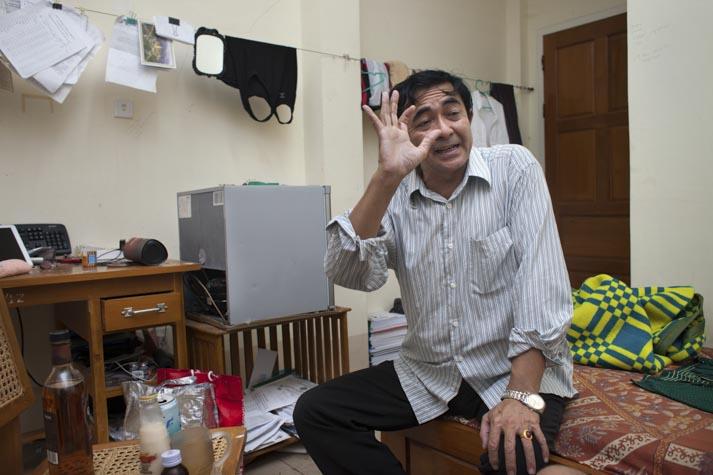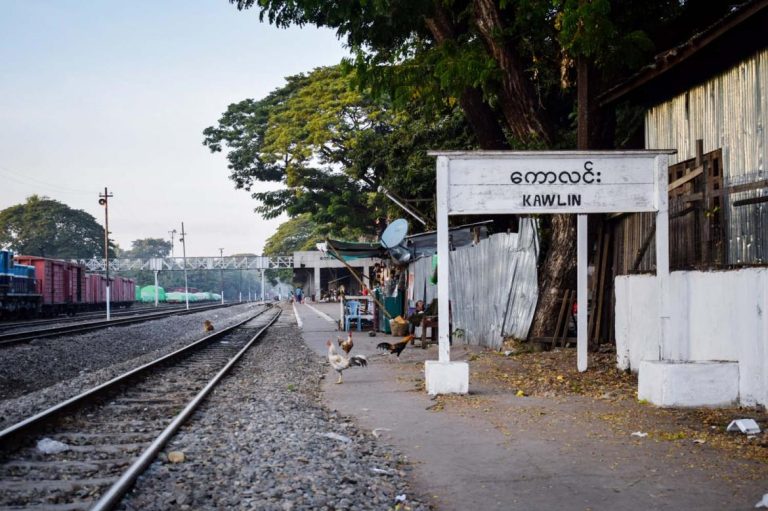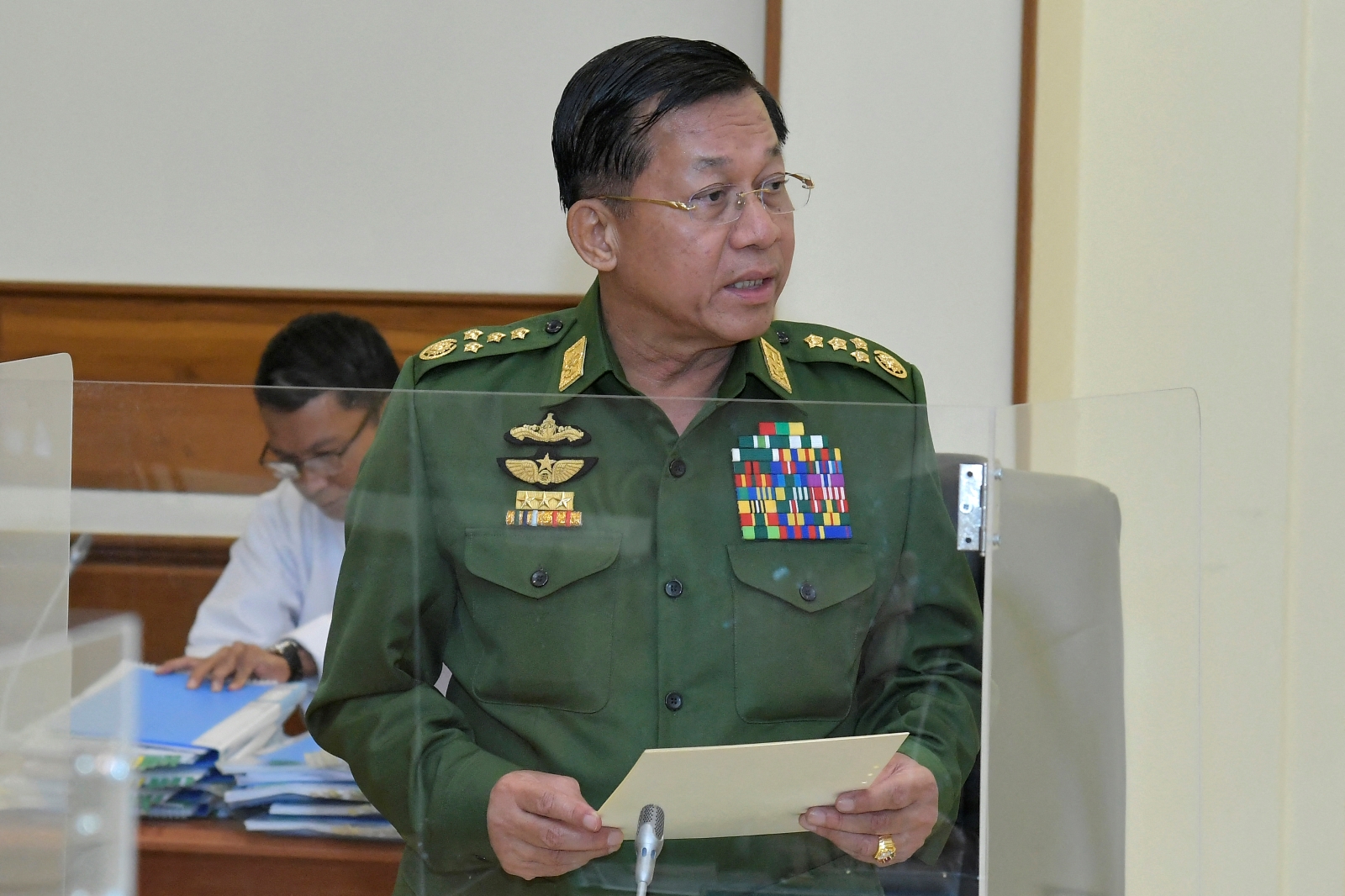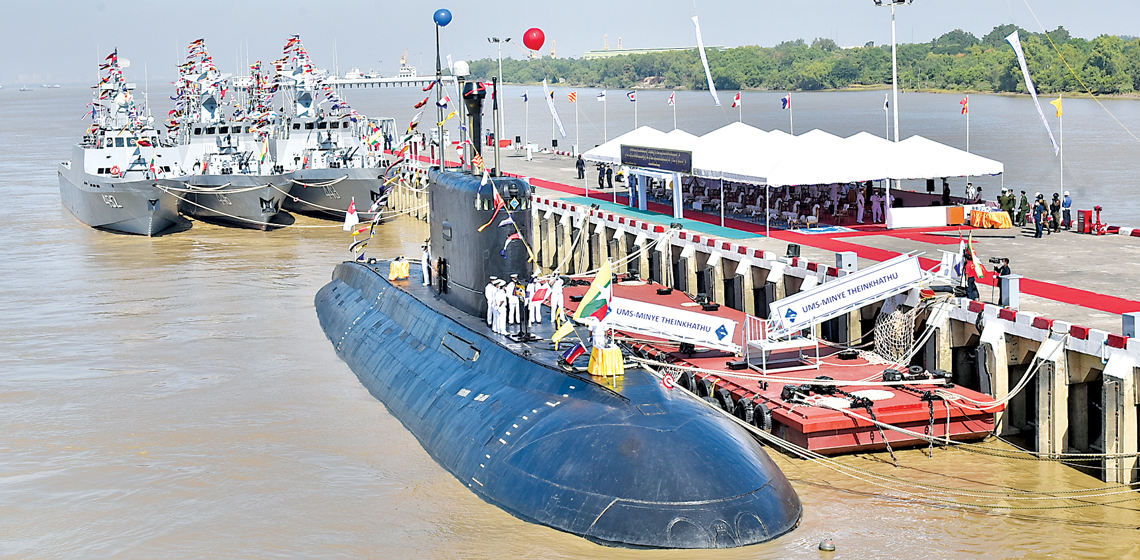Controversial ruling party MP U Hla Swe supports constitutional reform but says the Tatmadaw should continue to play a role in politics.
By OLIVER SLOW | FRONTIER
Photos JEROEN de BAKKER

typeof=
U Hla Swe, 54, who represents Magwe Region for the Union Solidarity and Development Party in the Amyotha Hluttaw, is widely known by his Myanmar nickname ‘Bullet Hla Swe’.
The former lieutenant-general seems to relish the nickname. He has published a book of his contributions to social media titled in Myanmar, Bullet Hla Swe’s posts for Facebook, and the back cover has an image of a bullet resting on the palm of a hand. U Hla Swe insists that that the popular belief that he once said the only way to negotiate with the Kachin Independence Army was with bullets, is not quite accurate.
“This ‘Bullet’ name, the media gave it to me,” he said. “The KIA rebels were fighting with the Myanmar Army, but we had invited them to the peace process. So we offered them the golden hand, but if they do not come then [I said] they get the bullet hand instead.”
Support more independent journalism like this. Sign up to be a Frontier member.
Some might argue that there is little difference between his explanation about the origin of his nickname and the reason for it in popular belief, but U Hla Swe insists that Myanmar cannot solve its problems with groups through violence.
“No, I would not give the bullet,” said U Hla Swe. “I know this because I am former army, a lieutenant-general,” he said proudly, pointing at his chest. “Negotiation is important because fighting will not solve the problems this country has. We want peace, I want peace.”

typeof=
From soldier to MP
U Hla Swe was born into a military family in Kyaukse, Mandalay Region, in 1960 and joined the Tatmadaw straight out of high school in 1978. Most of his 35 years of service with the Tatmadaw was spent fighting armed ethnic groups in border areas.
“I was always in the field, fighting the rebels. If there were rebels, I would go. If there were no rebels, I would not go,” he said.
During his military service, U Hla Swe suffered bullet wounds to the arm and leg.
The scar on his right forearm could be mistaken for a cigarette burn, but his left thigh has a big, dark mark.
“It went straight through; I was scared,” he said smiling, pointing to his groin. “But then I checked, everything was still there.”
U Hla Swe retired from active service in 2003 to take up an administrative role for the previous military government in Gangaw Township, Magwe Region. In 2006, he officially retired from the Tatmadaw for another administrative role before being asked to stand for the USDP in Gangaw in the 2010 general election.
Although he is clearly pro-military, U Hla Swe believes the Tatmadaw should gradually ease its grip on parliament.
“All CEC [central executive committee] members of the USDP want to change the constitution,” he told Frontier in a May interview, a month before the failed attempt in parliament to amend Article 436, the constitutional provision that gives the unelected military MPs who hold 25 percent of hluttaw seats an effective veto on charter reform.
“We want change, the President wants change, but there are still people in parliament and the army who do not want to change it, so it is difficult,” U Hla Swe said.
“There are still many issues for the country to overcome, so the army should play a role in the country’s political future,” he said. “[In] this election, 2015, the army has 25 percent of seats. In 2020, maybe 12 percent; after that seven percent. So I think it will gradually become less.”

typeof=
Military mindset
Despite appearing to support a move away from the military’s powerful role, some of U Hla Swe’s opinions are conservative.
He generated controversy last month for posting a series of homophobic outbursts on his Facebook page.
Not surprisingly, he is unwilling to countenance criticism of the Tatmadaw.
“You cannot say that people do not like the army,” he said, when asked if the Tatmadaw is unpopular. “People in big towns, like Yangon and Mandalay, they do not know war and have never needed the army. But the people in villages, they know what war is and support the army.”
He referred to areas in the Bago Yoma that once saw active conflict between the Tatmadaw and the Communist Party of Burma but have long been peaceful.
“In the past, there were big battles there, but now there is peace,” U Hla Swe said. “Those people like the army. If the rebel army’s flag flies at the top of the hill, people are not happy, but if the Myanmar army’s flag flies on the hill, people are happy,” he said.
U Hla Swe was asked about non-Bamar areas in which fighting continues, such as Kachin State, where a ceasefire between the Tatmadaw and the Kachin Independence Army collapsed in 2011.
“The only Kachin who support the KIA are living abroad,” U Hla Swe said. “Mostly the Kachin in Kachin State do not support them. So many people support the Myanmar army; you can go out and meet them,” he said.
A foreign aid worker with experience in Kachin State challenged U Hla Swe’s assessment. The Kachin people almost certainty have more affinity with the KIA than with Tatmadaw, said the aid worker, who asked not to be named.
“I think I am too old for politics. Look at our politicians, they are all around 70, there needs to be a younger generation of politicians. But if my party wants me to run, I will run.”
One of the most infamous examples of Tatmadaw brutality was its suppression in 1988 of the national uprising that came close to toppling the government. At least 3,000 people were estimated to have been killed; many were slaughtered in cold blood.
“Now people say that the control in 1988 [was bad], but this is false,” said U Hla Swe “It was not the wrong thing to do, but the right thing. A strong crackdown was needed to keep the country together. If the army had not controlled the crowds, our country would have been separated,” he said.
But was the brutality of the crackdown after the military seized power on September 18, 1988, justified?
“Both sides were very brutal. The army was using guns to shoot and the people were chopping off heads,” he said.
U Hla Swe was referring to incidents in downtown Yangon when it was a no-go area for the military before the crackdown, in which suspected government informers were burnt alive or beheaded and their heads paraded on pikes.
“During that time, there was so much change, so much confusion,” U Hla Swe said, adding that the presidency changed hands three times in a matter of weeks. “There were uprisings everywhere, so the army had to control strictly and strongly.”

typeof=
Looking ahead
Today, U Hla Swe has swapped the battlefield for an office in the Union parliament in Nay Pyi Taw.
“I used to think that people would never come here and that the generals who built it had no brains,” the MP said of the city built in secrecy until it was unveiled as the new capital in March 2006. “But now, people are starting to come and it will grow,” he said, adding that businesspeople have begun buying land in the capital in anticipation of future growth.
Nay Pyi Taw is hardly a buzzing metropolis, but there is more traffic on its roads than a few years ago and lively street-life is emerging in some areas. For U Hla Swe, the lack of congestion, 24-hour electricity and cheaper land makes living in Nay Pyi Taw far more desirable than Yangon.
U Hla Swe spends about seven months a year in Nay Pyi Taw, where he lives in a compound for USDP and USDP-aligned MPs.
The compound is clean and spacious, unlike U Hla Swe’s room. It is has two beds, one for sleeping and the other for dumping things on, such as golf clubs. The desk is cluttered with paraphernalia and a clothesline in the room – presumably for hanging clothes on, though there is no wardrobe – has tatty bits of paper clipped to it.
“They remind me of all the work I have to do,” he said, adding that he spends little time in the room, because he leaves for the parliament most mornings at about 6 or 7 and does not usually return until after dark.
As his first term as an MP nears an end, does he intend to run for another term?
“I think I am too old for politics,” said U Hla Swe, who owns a small farm near Gangaw. “Look at our politicians, they are all around 70, there needs to be a younger generation of politicians. But if my party wants me to run, I will run.”
U Hla Swe can expect more competition if he decides to seek re-election because the 2010 general election was boycotted by the National League for Democracy. Five years on, can the USDP beat an opposition party that seems to enjoy widespread popularity?
“The NLD and USDP are very close, so it is a big challenge,” U Hla Swe said.
“We need to show that we are working for the people’s benefit,” he said, adding that the USDP has been building infrastructure such as roads and bridges, particularly in rural areas, which he believes will help it in the election.
“It is a big challenge to move from a military government to a democratic one,” U Hla Swe said.
“In the past, you could say ‘Mr A, you go there, and Mr B, you go there’, and they would go there. But now you say the same and they say ‘No, I don’t want to go there.’ That’s democracy,” he said.
“The situation today is good, we should not go back to the past, but should move forward towards democracy.”







